
Paulina Susana Rubio Dosamantes is a Mexican singer, songwriter and television personality. Referred to as "The Golden Girl" and "Queen of Latin Pop", she first achieved recognition as a member of the successful pop group Timbiriche from 1982 through 1991. After leaving Timbiriche, she embarked on a solo career. Rubio has sold over 15 million records, making her one of the best-selling Latin music artists of all time.

Timbiriche was a Mexican pop music group. The group started as a children's group in 1981 and managed to evolve successfully into adulthood.

Mexican singer-songwriter Paulina Rubio has released eleven studio albums, fifteen compilation albums, 62 singles, ten promotional singles, and has made some eleven guest appearances. In 1992, Rubio signed a recording contract with record label Capitol Latin in order to launch her career as a solo artist, after recording ten albums with Timbiriche between 1982 and 1990.

Timbiriche VII is the seventh studio album by Mexican pop group Timbiriche, released on June 29, 1987, by Fonovisa Records. This album marked the beginning of Thalía Sodi's participation in the group and in the same year she also appeared on the Televisa production, Quinceañera.

La Banda Timbiriche: En Concierto or simply En Concierto is the third album from Mexican pop music group Timbiriche. It was released in 1983.

"El Último Adiós" is a song recorded by Mexican singer Paulina Rubio for her fifth studio album Paulina (2000). It was released as the second single from the album on July 17, 2000 by Universal Latino. Rubio co-wrote and co-produced the track with Estéfano, and was originally conceived it as a ranchera-hip-hop-styled song. Lyrically, its a break-up mood.

"Lo Haré Por Ti" is a song recorded by Mexican singer Paulina Rubio for her fifth studio album Paulina (2000). Written by Estefano and produced by Chris Rodriguez, the bolero-influenced pop rock song was then released as the lead single from Paulina on January 11, 2000, through Universal Music Latin, Polydor Records and Muxxic Records. The song marks Rubio's "comeback" single after the dissolution of her contract with EMI in the late 1990s. Lyrically, the song is about a woman who is willing to do anything for the man she loves, with refers to the tangos of the French Argentine artist Carlos Gardel.

"Nieva, Nieva" is a song performed by the Mexican singer Paulina Rubio, written by Cesar Valle and C. Sánchez and produced by Miguel Blasco. The song was recorded in Madrid, Spain, through the promotion of Rubio's debut album, La Chica Dorada and the recording sessions for her second album. It was eventually released as the lead single from her second studio album 24 Kilates on September 29, 1993.
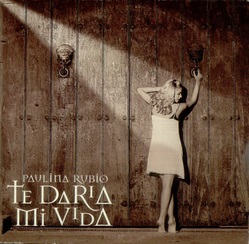
"Te Daría Mi Vida" is a song by Mexican singer Paulina Rubio, taken from her third studio album El Tiempo Es Oro (1995), written by C. Sánchez and C. Valle and produced by Miguel Blasco. The song was released as the album's lead single on 17 January 1995 by EMI Music. "Te Daría Mi Vida" is a dance-pop song and allegedly sold more than 140,000 copies in Mexico and the United States. The accompanying music video for the single was directed by Carlos Marcovich and was filmed in Xochimilco and the Estudios Churubusco in Mexico.
"Vuelve Junto A Mi" is a song performed by the Mexican singer Paulina Rubio written by Carlos Sánchez and Cesar Valle with the latter also producing the song. The song was released in March 1994 as the third single from Rubio's second studio album 24 Kilates.

Timbiriche VIII & IX is the eighth and ninth studio album by Mexican pop group Timbiriche, released on May 7, 1988, by Fonovisa Records. It was the first album that Edith Márquez recorded with the group after Mariana Garza left to start a solo career, and the last for Alix Bauer, Eduardo Capetillo and Thalía Sodi. In 1989, the album was certified Platinum, it sold over one million copies in Mexico.

"Él Me Engañó" is a song performed by Mexican singer Paulina Rubio, recorded for her second studio album 24 Kilates (1993). The song was written by César Valle and Don Matamoros, and was released on February 3, 1994 as the second single off the album by EMI Latin. The song has been sporadically mentioned by the media as one of the singer's most acclaimed female anthems.

"Asunto De Dos" is a pop-rock song written by José Ramón Flórez and Fredi Marugán, and produced by Miguel Blasco for Mexican singer Paulina Rubio's second studio album, 24 Kilates (1993). The song was released as the four and last single off the album by EMI Latin on une 4, 1994. It peaked at number twelve on the Mexican Singles Chart.
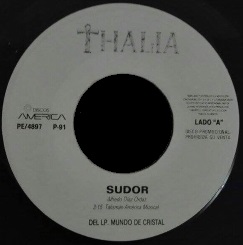
"Sudor" is a song by the Mexican singer Thalía released as the first single of her second album release Mundo de Cristal, in 1991. "Sudor" is the second of four songs in which Thalía talks about body fluids, the others are "Saliva", "Sangre" and "Lágrimas" from the albums Thalía, Love and En éxtasis, respectively.
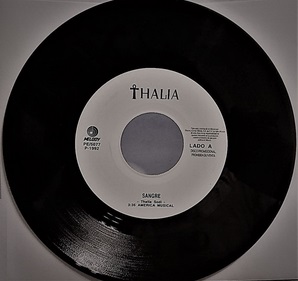
"Sangre" is the first single taken from the album Love by Mexican singer Thalía. The song was composed by the singer herself and the lyrics are dedicated to Alfredo Díaz Ordáz who died before the album was released. The song was successful in Mexico peaking at number two in the Notitas Musicales chart. "Sangre" is the third of four songs in which Thalía talks about body fluids, the others are "Saliva", "Sudor" and "Lágrimas" from the albums Thalía, Mundo de Cristal and En éxtasis, respectively.

"Love" is a song by the singer Thalía, released as the third single from the album Love, from 1992. The track was released as 12" single with remix versions and a music video was made for the TV special Love Thalía, from 1993. The song appeared on the charts of the Mexican newspaper El Siglo de Torreón and the magazine Notitas Musicales.
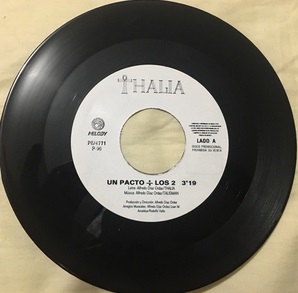
"Un Pacto Entre los Dos" is a song by Mexican singer Thalía from her self titled debut solo album. It was released by Melody/Fonovisa as the album's first single and despite the controversy caused by its lyrics, it managed to be successful on the Mexican charts.
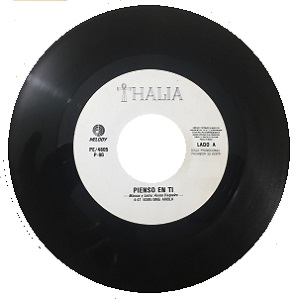
"Pienso en Ti" is a song by Mexican singer Thalía from her self titled debut solo album. It was released by Melody/Fonovisa as the album's third single after the controversies generated by the previous songs. It achieved the album's best performance on the Mexican charts. About 20 years after the release, the song was part of the singer's Primera Fila live show and appeared as a bonus track for the special edition of the album: Primera Fila...un año después, released in 2010.
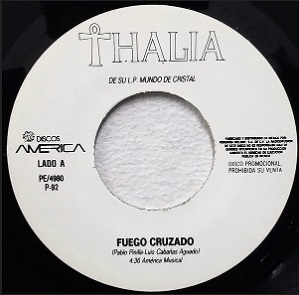
"Fuego Cruzado" is a song by the singer Thalía released as the third single from the album Mundo de Cristal, in 1992. The song was released after the controversy caused by the lyrics of the singer's previous single and was successful in the singer's home country.
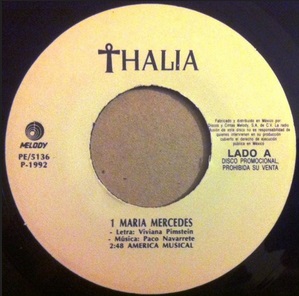
"Maria Mercedes" is a song by the singer Thalía which was used as the soundtrack of the soap opera of the same name. The song was included in the re-released of Thalía's album Love and was promoted on TV and live performances. The song manage to give the singer another successful single. A remixed version was included in the tracklist of the digital download and streaming versions.



















